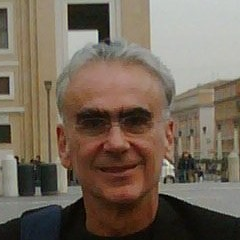If the set of the Wiener Staatsoper’s new production of Don Giovanni is meant to stand as a metaphor for the inner landscape of most of its characters, then designer Katrin Lea Tag has come up with a winner. Cold and barren, the frozen lava rock extending from the proscenium to the backcloth is an apt image to the harm done to their souls. That the Don even has a soul is up for debate, not least in Barrie Kosky’s staging of Mozart’s darkest opera. He either kills, beats or betrays all of those he encounters (doing so with particular zest here). A touch to the shoulder of Leporello is his only gesture of affection throughout the entire three hours of the physical or mental cruelty he inflicts on others... and even that comes when the Don is no longer human but a spirit, risen from the dead.
By contrast, Donna Anna, Don Ottavio and Donna Elvira almost seem normal, although they reveal themselves as emotionally crippled through the hurt inflicted upon them. Donna Anna, whose father is killed by Don Giovanni, is Electra, like the heroine of Strauss’ opera, living only to avenge him. Her obsession chokes whatever love she might have had for her fiancé, Don Ottavio, leaving him begging for her “I do,” with no assurance that she will ever utter those words. Leporello’s relationship to his master is addictive, that of a child suffering from a dominant father. And Donna Elvira? Once a proud noblewoman, she’s now turned into little more than the Don’s stalker, repeatedly abasing herself for the slightest sign of his affection. Only the peasants Masetto and Zerlina escape the Don’s curse, happily announcing their upcoming marriage in closing ensemble. But even they show the lasting scars of their acquaintance with the opera’s toxic hero, joining joyfully with the others in the vengeful vocal celebration of his demise.
Kosky’s interpretation is more dramma than giocoso, but pleasingly so. As the Don, Kyle Ketelsen oozed testosterone, overwhelmingly to the good, though not always. “Deh! vieni alla finestra” had the requisite cockiness of a serial seducer without the tenderness that the one he is serenading would expect from a suitor. With Philippe Sly’s bass-baritone very similar to Ketelsen’s, purists might have taken exception to casting him as Leporello. Dramatically, the hoodie-wearing, somersault-turning Sly owned the role of the servant wanting to be like his master one moment, hating him the next. The one fault with Hanna-Elisabeth Müller’s singing was its dynamic level. Donna Anna is often sad or introspective, but some of those moments were lost in Müller’s interpretation and her voice threatened to overpower the others in ensembles. Stanislas de Barbeyrac (Don Ottavio) had to push for the occasional higher note but showed lovely control in “Il mio tesoro” even though his voice was less leggero than dramatic. Casting Kate Lindsey as Donna Elvira reflected the perils of choosing a mezzo-soprano for a soprano role. Her voice was warm and powerful but occasionally stretched in the high registers. Patrizia Nolz and Peter Kellner worked well together as Zerlina and Masetto, while Ain Anger’s powerful bass lent the role of the Commendatore the required gravitas.
Some elements of a traditional Don Giovanni are missing in this production. Here, the Don dies of a heart attack instead of being transported to hell, presumably claimed by a life of excess and the fright caused by the Commendatore’s return from the netherworld. And there are few props, with no weapons either for the victims hunting him or for the Don, who kills Donna Anna’s father with a rock. But the main components of what makes for good opera are all there: good to excellent singing, convincing dramatics, and an orchestra that elevates the principals instead of competing with them. Kudos to Philippe Jordan for conducting a controlled but compelling performance, from the first heavy notes of the D-minor overture to fine orchestral underpinning of the musically complex finale on stage.
Though the opera’s 1787 world premiere in Prague was well received, not all were totally enamoured with it. At its Vienna premiere a year later, Emperor Joseph II told Da Ponte, Mozart’s librettist that “such music is no meat to the teeth of my Viennese.” To which, the composer famously replied, “Give them time to chew upon it.” The composer would have been pleased to know that this performance required very little chewing.




